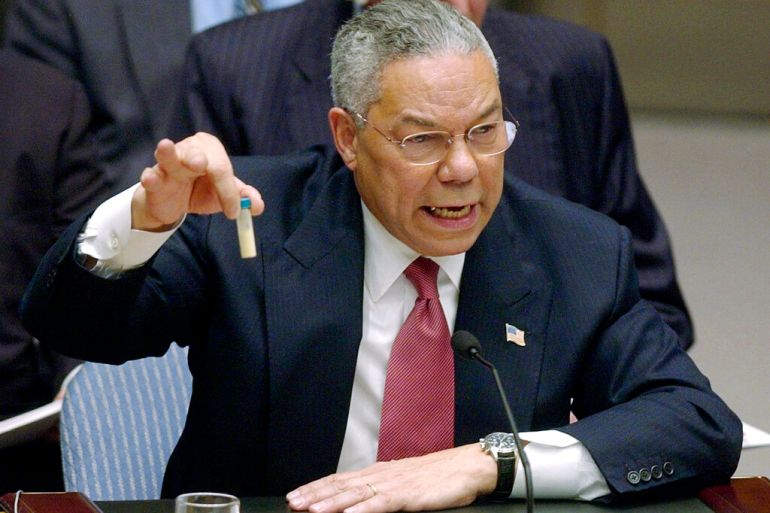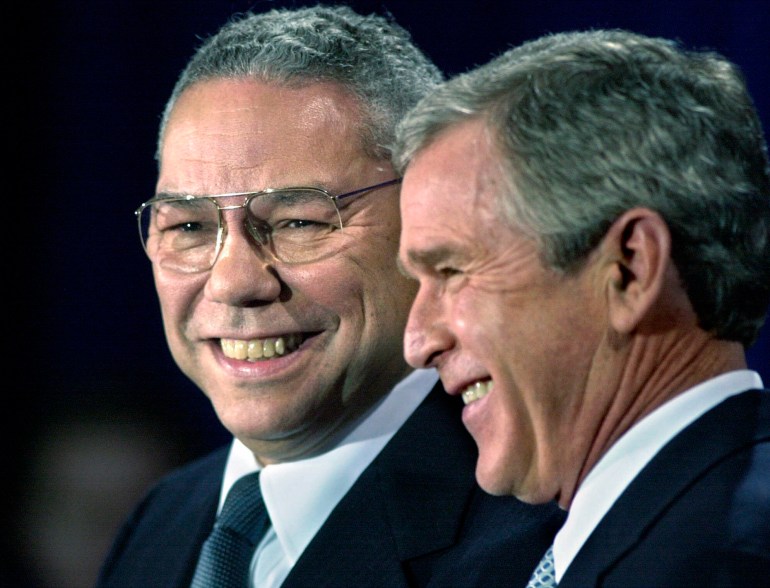‘Blot’ on Powell’s record: Lies to the UN about Iraq’s weapons
Powell used his reputation for credibility to help convince the world Saddam Hussein was an imminent threat, but the US intel was false.

On February 5, 2003, as the United States was preparing to invade Iraq, Secretary of State Colin Powell made a pivotal presentation to the United Nations Security Council claiming Saddam Hussein was developing weapons of mass destruction (WMD).
The biological weapon anthrax could be delivered against Iraq’s neighbours or the US by unmanned aerial vehicles, Powell claimed, dramatically holding up a small glass vial as proof.
Keep reading
list of 4 itemsIn Pictures: Colin Powell
Iraq probe reaches deal on Bush-Blair records
Powell regrets Iraq failings
“Saddam Hussein and his regime will stop a nothing until something stops him,” Powell told the UN Security Council, arguing that Iraq was deceiving UN weapons inspectors.
Powell’s presentation was forceful, seemingly exhaustive and had the effect of cinching the US case for preemptive war against Iraq before the international community.
“What we are giving you are facts and conclusions based on solid intelligence,” Powell told the Security Council.
But it was not true. The underlying intelligence was false. For Powell, who died at age 84 on October 18 from complications of COVID-19, it proved to be an enduring stain on his record.
Powell, who was secretary of state from 2002 to 2005, gave an elaborate description of Iraq’s weapons programme and sought to tie Hussein to al-Qaeda in “ambition and hatred”.
“This was a typical American show, complete with stunts and special effects,” Iraq Lieutenant General Amir al-Saadi, who had overseen Hussein’s weapons programme, said of Powell’s presentation at the time.

History has proven al-Saadi correct; Iraq had destroyed its special weapons in compliance with UN mandates.
Before the US invasion, no weapons of mass destruction had been found in more than 70 UN site inspections. And none was found after by the US military.
Powell was defensive at first, denying to Congress in 2004 that US intelligence had been twisted to justify the US invasion.
“Truth is the first casualty of war. I would contend that the truth was murdered before a shot was fired,” Representative Gary Ackerman, a Democrat, told Powell in a contentious hearing.
Powell snapped back, “The truth was not murdered, Mr Ackerman. Nobody shaped it, nobody told the intelligence community what to say.”
Years later, confronted with the facts, Powell was forced to acknowledge that his UN presentation, painstakingly prepared across several days by the CIA, was wrong.
“It turned out, as we discovered later, that a lot of sources that had been attested to by the intelligence community were wrong,” Powell told Al Jazeera in 2011 interview.
As became clear, questionable US intelligence reports had been cherry-picked and elevated to support President George W Bush’s propaganda drive to convince Americans that war against Iraq was necessary. Powell’s UN speech was pivotal in swaying US public opinion.
“It has blotted my record, but you know, there’s nothing I can do to change that blot. All I can say is that I gave it the best analysis that I could,” Powell told Al Jazeera.
In the weeks and months that followed the US invasion on March 19, 2003, US forces struggled to find evidence of WMD.
“I was more than embarrassed. I was mortified,” Powell said in a 2017 interview on Bloomberg, admitting his presentation had been pivotal.
“I’m the one who made the biggest presentation of it, and so it all sort of fell on me,” said Powell who repeatedly blamed the US intelligence agencies for producing bad information.
“There wasn’t a word in that speech, that presentation that was not vetted and approved by the intelligence community,” Powell told CNN interviewer Larry King in 2010.
In fact, Powell had been apprehensive about the US intelligence on Iraq and he confided to the British Foreign Secretary Jack Straw at the time that he feared the doubtful claims would “explode in their faces”, according to reports of Straw and Powell’s conversation.
The bad intelligence was produced by political appointees working for then-Secretary of Defense Donald Rumsfeld and Vice President Dick Cheney.
I Lewis “Scooter” Libby, a top aide to Cheney, and Douglas Feith, who headed Rumsfeld’s Office of Special Plans, produced a series of bogus claims including that Iraq had bought a uranium source from Niger and that there were links between al-Qaeda and Hussein’s government.
The two worked to incorporate the information into talking points and presentations and they targeted doubters like Powell inside the administration and critics outside.
Libby was later convicted for publicising the identity of CIA agent Valerie Plame in retaliation against her husband Ambassador Joe Wilson, who had publicly challenged Bush’s arguments.
A former US ambassador to Niger, Wilson had investigated the Niger uranium claims at the request of the CIA in 2002 and reported back that they were false.
George W Bush commuted Libby’s 30-month prison sentence for revealing Plame as a secret agent but did not pardon him, leaving in place his felony conviction.